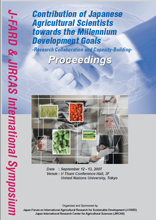Agro-environmental research in developing countries

It is widely recognized that the environment issues are one of the most challenging ones for sustainable
development of both developing and developed countries in this century. In many scenes of the world, the
impacts of expanded human activities on the environment are now nearly or have exceeded the natural
capacity of ecosystems at the limit that allows us to a sustainable use of the resources. The issues are
strikingly apparent in the scenes of agriculture, where an excessive environmental impact often limits the
production of crops and animals.
As well as the other environmental issues, agro-environmental problems take place at the scale of
either local or global. There are many serious local problems in agro-ecosystems of developing countries,
including eutrifi cation of water, air pollution by photochemical species, contamination of toxic substances in
soils, and others. Various agro-environmental research projects have been directed to solve these problems
by international collaboration with Japanese research institutes. For example, I have joined a JIRCAS project
on nitrogen cycle in Chinese agricultural systems during 1997 to 2003. The results of the project determined
significant impacts of fertilizer nitrogen on water and air quality through large outputs of nutrient and
gases from the crop lands. Recent excess use of fertilizer nitrogen in China has been recognized by many
researchers (Zheng et al., 2002), and its environmental risks and some approaches to reduce the impacts have
also been discussed (Freney et al., 2007). However, despite of these accumulation of research results, it seems
that introducing improved nutrient management to the crop lands is not easy at local level. This is probably
and partly due to less linkage between researchers and policy makers. In addition, it involves an inevitable
criteria, even in the developed countries, that development always takes priority over the environment in a
relatively short span of time.
However, under the recent environmental crises that we are facing, it is definitely needed to give
higher priority to the environmental issues. For that purpose, I would like to suggest the needs of effective
linkages among different persons or parties concerned with the identical problem. First linkage is that
among scientists or experts from different specialties. It is generally requested that environmental scientists
should cooperate with agronomists in order to make two-way view from environment and production. In
addition, participation by socioeconomists is expected for cost and fiesibility analysis. Second linkage is
that between researchers and policy makers. It is not realistic, in many cases, to make practicable or extend
an environmentally mitigation option to local farmers without political control by regulation or subsidies.
Therefore, it is recommended that policy makers participate in the project from the planning to the follow-up
stages.
The third linkage could be the international one coupled with an international framework to control
environmental quality. “Agenda 21” (1992) and Johannesburg Declaration on Sustainable Development
(2002) can be the base for the actions. The Stockholm Convention for controlling persistent organic
pollutants (POPs) in the environment has entered into force in 2004 with more than 150 signatory countries.
National Action Programmes to tackle desertifi cation have submitted from nearly 100 countries under the
United Nations Convention to Combat Desertifi cation (UNCCD). The International Nitrogen Initiative (INI)
presented the Nanjing Declaration on Nitrogen Management to the United Nations Environment Programme
in 2004.
Such international frameworks are more effective for challenging global environmental issues. A
good example is those for coping with global environmental changes. Over a decade ago, most countries
joined the United Nations Framework Convention on Climate Change (UNFCCC) to begin to consider
what can be done to reduce global warming. Recently, a number of nations have approved an addition to the treaty: the Kyoto Protocol, which has more powerful, and legally binding, measures. Although none
of the developing countries have obligations to reduce greenhouse gas emissions under the current Kyoto
Protocol, they are requested to submit national emission reports to the UNFCCC. This gives the experts in
each country the needs to study greenhouse gas emissions from the sources including agricultural lands and
animal industries. In addition, the Clean Development Mechanism (CDM) established by the Kyoto Protocol
allows developed countries to earn emissions credits from their investments in emission-reducing projects
in developing countries. Therefore, CDM can be used as a new tool for conducting environmental projects
in developing countries. Beside such frameworks under the international treaties, international scientific
programmes, such as the International Geosphere-Biosphere Programme (IGBP) and the International
Human Dimensions Programme (IHDP), have been organized to promote and coordinate research projects
on global environmental changes. These programmes have engaged a growing number of developing country
scientists in its research, capacity building and scientific committees activities. Actually, in the sector of
agriculture, CGAIR has organized joint meetings and research projects in cooperation with IGBP and IHDP.
In order to promoting the linkages above mentioned, it is essential to encourage a researcher or expert
to work as a coordinator of the cooperation. Environmental research programmes always stand in need of
participation and contribution from different fi elds. In addition, I would like to point out follow-up support
for young researchers. When I participated in international meetings, such as the preparation meetings of
IPCC Guidelines and various IGBP meetings, I have always unfortunated to find less participants from
developing countries, in particular from Asia. Therefore, in addition to train and promote young researchers
in developing countries within a research project, it is necessary to follow those experts up with continuous
support for further contributions to international communities.
| Date of issued | |
|---|---|
| Creator | Kazuyuki Yagi |
| Subject |
Clean Development Mechanism (CDM) cooperation linkage international frameworks sustainable |
| Publisher | Japan International Research Center for Agricultural Sciences |
| Available Online | |
| Issue | 2007 |
| spage | 69 |
| epage | 74 |
| Rights | Japan International Research Center for Agricultural Sciences |
| Language | eng |
